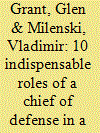| Srl | Item |
| 1 |
ID:
181993


|
|
|
|
|
| Summary/Abstract |
New democracies face significant difficulty in understanding the position of the Chief of Defense (CHOD) and its difference from the traditional/historical role of Chief of the General Staff (CGS). Many of those states attempted to transition from CGS to CHOD upon the advice from Western allies. This move usually followed critical failures in the defense systems. These failures often occurred after bad political decisions regarding the armed forces because the political leadership was in the dark about their true condition. The role of the CHOD, as envisaged and implemented in most long-standing democracies, is designed both to solve this deficiency and to ensure that the armed forces are fit for the future. This article outlines how and why this is the case and identifies precisely what it is that a CHOD should do.
|
|
|
|
|
|
|
|
|
|
|
|
|
|
|
|
| 2 |
ID:
161360


|
|
|
|
|
| Summary/Abstract |
By any objective measure, defense institutions in Central and Eastern Europe have all but universally been incapable of producing viable defense plans that are based on objective costing and operational planning data. This situation exists in spite the provision of considerable Western advice and assistance, let alone reporting to and receiving assessments by NATO’s International Staff under Partnership for Peace, as well as via the integrated defense planning and reporting systems. An explanation for this systematic failure across European post-Communist defense institutions can be found in the continued slow development of an over-arching policy framework which directs and approves all activities of the armed forces, as well as the de-centralization of financial decision-making down to capability providers. The essay ends with an examination of the adverse effects of the early introduction of planning programming, budgeting system (PPBS), have had on the development of effective policy and planning capabilities within these defense institutions.
|
|
|
|
|
|
|
|
|
|
|
|
|
|
|
|
| 3 |
ID:
160995


|
|
|
|
|
| Summary/Abstract |
Using two recently published essays by the current writer that assesses the dismal record of performance of Planning, Programming, and Budgeting System in enabling communist legacy defence institutions in Central and Eastern Europe to develop viable defence plans, this essay argues the need for deep reforms in the region’s defence institutions. To guide this reform effort, pragmatic solutions are suggested to improve the ability of these organisations to produce viable defence plans. Recommended reforms are: (1) conduct conceptual and cultural “audits,” (2) make operational and financial data central to decision-making, (3) change current organisational sociology, (4) examine planning methods and practices, and (5) stress the need to adopt policy frameworks to drive the operation of defence institutions.
|
|
|
|
|
|
|
|
|
|
|
|
|
|
|
|